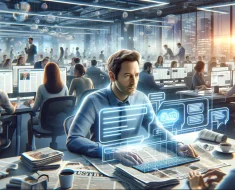Volkswagen is gearing up to revolutionize the driving experience in 2024 by integrating ChatGPT into its vehicles. The German automaker aims to enhance the in-car voice assistant, IDA, with the powerful OpenAI chatbot. This move announced at CES 2024, makes Volkswagen the first volume manufacturer to offer ChatGPT as a standard feature.
Also Read: CES 2024 Preview: A Sneak Peek into the Future of AI & Tech
The Breakthrough Integration
In a groundbreaking move, Volkswagen plans to inject ChatGPT into its European vehicles, starting in the second quarter of 2024. This integration will enable drivers to interact with the chatbot through the existing IDA voice-controlled assistant, launched by Volkswagen in 2023. The ID.7, ID.4, ID.5, ID.3, Tiguan, Passat, and Golf models will automatically gain access to ChatGPT without the need for additional accounts or installations.
Also Read: Deloitte’s PairD AI Chatbot: Transforming Workflows and Fostering Inclusivity

How It Works
The integration is made possible through a collaboration with Cerence, a startup that emerged from Nuance in 2019. The AI-driven chatbot can be activated by saying “Hello Ida” or pressing a button on the steering wheel. Ida, Volkswagen’s voice assistant, assesses whether the requested action is specific to the vehicle, such as adjusting the air conditioning, and either performs the task itself or contacts Cerence servers for assistance from ChatGPT.

Privacy and Security
Volkswagen assures users that ChatGPT does not access any vehicle data, prioritizing privacy. Questions and answers are instantly deleted, maintaining a high level of data protection. Cerence Chat Pro plays a crucial role in leveraging ChatGPT and other sources to provide accurate and relevant responses to a wide range of queries.
Global Rollout and Considerations
Volkswagen’s ambitious plan to make ChatGPT a standard feature in the second quarter of 2024 positions it as a pioneer in the automotive industry. While the initial rollout is slated for Europe, the manufacturer is considering a global expansion. The move aligns with a broader trend in the automotive industry, with other companies like Mercedes also exploring ChatGPT integration.
Also Read: Your Next Mercedes-Benz will have an AI-Powered Virtual Assistant
Our Say
While the introduction of ChatGPT into Volkswagen vehicles signals a leap into the future, questions arise about the reliability of AI in driving scenarios. The hands-free, information-searching functionality may prove useful, but trust in the technology remains a crucial factor. Volkswagen’s commitment to privacy and security is commendable, and as the automotive landscape embraces AI, the road ahead promises both innovation and challenges.
Volkswagen’s bold step to integrate ChatGPT into its vehicles showcases the evolving landscape of in-car technology. It shapes a future where conversations with AI co-pilots become the new norm. Time will tell if ChatGPT becomes a seamless part of the driving experience or encounters roadblocks in its journey.
Follow us on Google News to stay updated with the latest innovations in the world of AI, Data Science, & GenAI.





